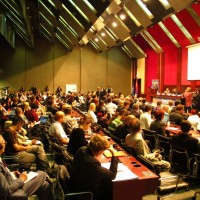 Christoph Steck /@christophsteck
Christoph Steck /@christophsteck
Director of Public Policy and Internet at Telefónica
 “I am confused” – these were the honest words of a young participant at the European Dialog on Internet Governance (EuroDIG) conference which took place last week in Belgrade (see our previous post). I participated together with other business representatives from Cisco and Google in a workshop with representatives from the New Media Summer School on “Ethics and Corporate Responsibility”.
“I am confused” – these were the honest words of a young participant at the European Dialog on Internet Governance (EuroDIG) conference which took place last week in Belgrade (see our previous post). I participated together with other business representatives from Cisco and Google in a workshop with representatives from the New Media Summer School on “Ethics and Corporate Responsibility”.
The set-up was unusual and helped to created a lively debate which focused quickly on the issue of privacy on the Internet and the control of Internet users over their “digital footprint” (regarding that issue see also our recent post from the debate at the IGF Spain).
My take-away: I realised that the so-called “Digital Natives”, the first generation which grew up with mobile phones, Internet and Social Networks at their fingertip, are just waking up and start to understand that there are also some dangers in the virtual world: the natives understand that they are living in the wild and not in a zoo.
“I am really grateful for all the new services and possibilities I can now use online, they have totally changed and improved my life” – also a quote from the debate which shows that modern communication tool are seen as enhancing lives. They are also believed to be so much part of everyday social life that not using them is not considered a realistic option. But then, it was asked, what happens to that information I post today to my friends on a Social Network, will it be stored and is still visible in a couple of years when I might have changed my opinion and views? Can and should the Internet be able to forget? And if so, in what circumstances?
A couple of results crystallized during the debate:
– Young Internet users want control over their data and information. They want to be able to know and decide what is kept stored on servers and what they might want to delete if they feel it is not appropriate anymore. They want transparency about business practices and how and for what collected data is being used.
– Self-constraint needs to grow as well: Do I really need to put this photo from yesterday’s party online? What can I share with my over 500 “friends” on my Social Network – and what better not?
– Awareness for privacy is the first step and might even over time create growing user demand for online services with much higher privacy standards. However, such services will maybe not be “for free” as current models. However, paying for an online service and not let others pay it through advertisement could give influence back to users.
A good and emotional debate which shows that youth is trying to get a grip on an issue is affecting their everyday life. There is no easy solution for the issue of online privacy, but the youth participants clearly showed sympathy for the idea that their personal data is valuable and needs to be protected. And that data needs to be treated using the same standards and rules, wherever it is collected and by whoever.
And one thing is evident: if Internet users, young or also not that young anymore, do not feel that they can trust services and applications on the Internet, they will not use such services in the same way they do until now. Creating trust and confidence to use the Internet therefore needs to be the common goal for business and policy-makers.
Confusion is bad for all: consumer, business and ultimately the Internet itself.
Are you also confused about what happens with the data and information you put on the Internet? What is your way of dealing with that? What could be a solution to create more trust for Internet users?
Christoph Steck, Chief Regulatory Officer, Telefónica Europe.








